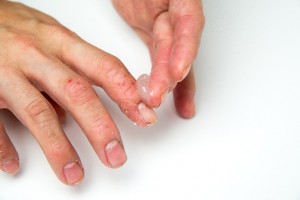

 Psoriatic arthritis (PsA) onset in psoriasis patients is linked to physical trauma. The risk of psoriatic arthritis was found to be higher when physical trauma affected the bones or joints directly. Senior author Dr. Thorvardur Love said, “This is the first sizable population-based cohort study to determine the risk of PsA following trauma in psoriasis patients. Our findings highlight the importance [of] further study into the complex factors that lead to arthritis in psoriasis patients, as we may find ways to modify the risk once we fully understand it.”
Psoriatic arthritis (PsA) onset in psoriasis patients is linked to physical trauma. The risk of psoriatic arthritis was found to be higher when physical trauma affected the bones or joints directly. Senior author Dr. Thorvardur Love said, “This is the first sizable population-based cohort study to determine the risk of PsA following trauma in psoriasis patients. Our findings highlight the importance [of] further study into the complex factors that lead to arthritis in psoriasis patients, as we may find ways to modify the risk once we fully understand it.”
Psoriatic arthritis is a common form of arthritis in psoriasis patients, which can negatively impact a patient’s quality of life. Psoriatic arthritis may contribute to disabling joint damage and occurs in 30 percent of psoriasis patients.
Earlier, trauma has been found to play a role in psoriatic arthritis. This association has led to the concept of a “deep Koebner” phenomenon. In psoriasis patients, after an injury-induced trauma to a skin area, a psoriatic lesion would often form in the same place. The same concept may be true for psoriatic arthritis, but involving deeper tissue, including bones and joints.
The researchers looked at data from 15,416 psoriasis patients exposed to trauma and 55,320 unexposed controls. A total of 1,010 cases of psoriatic arthritis was noted for both groups.
There were 22 cases of psoriatic arthritis per 10,000 person-years among the unexposed controls, and 33 cases per 10,000 person-years among those who experienced trauma. Even after adjusting for other risk factors, the exposed-to-trauma group still had higher rates of psoriatic arthritis, compared to the unexposed group.
Aside from physical trauma, there are other risk factors that contribute to psoriatic arthritis. Some of these include being overweight (fat tissue promotes the circulation of cytokines, which are associated with inflammation), having psoriasis in the nails, receiving an early psoriasis diagnosis, having a family history of psoriatic arthritis, having a strep throat – studies have shown the bacteria responsible for strep throat may play a role in psoriatic arthritis, having HIV, and being under stress.
Stress, in particular, has been found to worsen overall health outcomes, so no matter what diagnosis you have, reducing stress as much as possible is always a wise decision.
Copyright © www.orthopaedics.win Bone Health All Rights Reserved